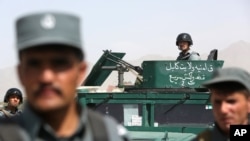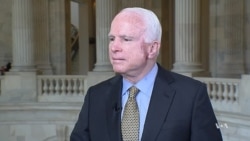The first direct talks between Afghan government and Taliban representatives in neighboring Pakistan are being widely welcomed as an important step towards ending years of hostilities in Afghanistan.
Intelligence sources tell VOA a four-member Taliban delegation attended the Pakistan-hosted talks near Islamabad with “complete consent” of the insurgent group’s fugitive “central leadership.”
The Taliban delegation was led by senior leader Mullah Abbas Durrani; Afghan Deputy Foreign Ministry Hekmat Khalil Karzai headed the Kabul delegation, which included close aids of Afghanistan President Ashraf Ghani and Chief Executive Abdullah Abdullah.
American and Chinese representatives also participated as observers in what is being dubbed an “ice-breaking, historic” meeting that, lasting several hours, ended after midnight.
Pakistani intelligence officials told VOA the discussions were “mature” and held in an “extremely positive atmosphere," and officials privy to the meeting described the conversations as “introductory.” Both sides have agreed to meet again after the Muslim holy month of Ramadan, though no further details were disclosed.
Significant but nascent development
In a brief interview with VOA, Masood Khan, head of Islamabad’s state-run Institute of Strategic Studies, emphasized the need to sustain the process for achieving lasting peace in the region.
“This is a very significant development, but we must realize that it is the beginning of a process. We need all the ingenuity and skill to maintain it," he said. "These talks are so important and critical that they should not be allowed to be distracted or undermined by any force, and despite the complexity of the dialogue ... there should be no deviation from the path of engagement.”
A Taliban statement sent to VOA Wednesday said, "officials at the Taliban’s political office in Qatar have been fully empowered to hold negotiations with national and international interlocutors wherever and when they want to do so."
The statement did not mention the Islamabad meeting.
Until now, the Taliban has insisted on withdrawal of all NATO forces from Afghanistan and a redrafting of the constitution before engaging in a peace and reconciliation process.
While Khan says the recent meeting demonstrates Pakistan’s “sincerity” to help Afghanistan and establish a peaceful bilateral relationship, he cautioned that both Afghan officials and Taliban militants must show flexibility as the process moves forward.
“They will have to make compromises as they go along, [and] I hope that as they invest in consensus building there would be de-escalation," he said. "Also because in the clashes or the asymmetric warfare incidents or terrorist attacks civilians are getting hurt, and this ought to be stopped.”
Mutual exhaustion
Female Afghan lawmaker Shukria Barakzai, a Ghani ally who remains a cautious skeptic of the Taliban — the outspoken legislator was wounded in a suicide bomb attack on her vehicle that killed three bystanders in Kabul last year — says the prolonged hostilities have exhausted both sides and she believes this is a major reason behind the meeting.
“I would like to see the peace process as a process .... [with] clear mechanism, and the result of that mechanism will be ceasefire as soon as possible,” she said.
International Crisis Group analyst Graeme Smith says the Afghan conflict is getting bloodier and the engagement in Islamabad could help ease the situation.
“We are in the midst of just infernal violence, record-breaking levels of insurgency here in Afghanistan," he said. "And so it is very good that these conversations can continue even as the fighting reaches new peaks.”
The head of the U.N. Assistance Mission in Afghanistan welcomed the meeting, saying it should be recognized as the outcome of the recent concerted efforts at rebuilding relations between Afghanistan and Pakistan.
Pakistani officials say they worked extremely hard to create a unique opportunity and it is now up to the Afghan government to promote peace in their country.
Some critics say the emergence of pro-Islamic State groups in Afghanistan, which have engaged in bloody clashes with Taliban fighters in parts of country, could be a factor behind Taliban inclination toward engaging in a national peace and reconciliation process.
Watch related video interview with Sen. John McCain






